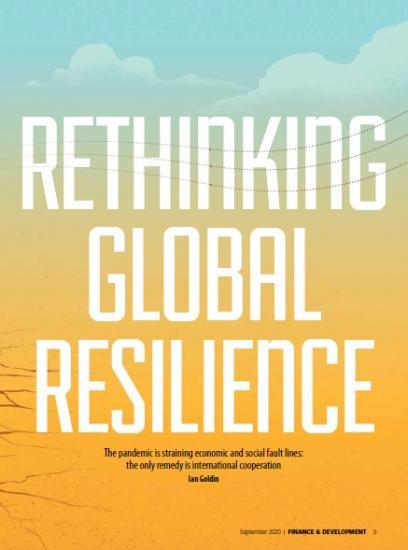Rethinking Global Resilience
8th September 2020

In the newest issue of Finance & Development of the International Moneatry Fund, Oxford professor of Globalization and Development Ian Goldin writes the pandemic has highlighted our lack of immunity to natural threats, but also created an opportunity to reset our economies.
"There is no shortage of ideas regarding green stimulus policies, which offer the potential to build back better and accelerate the transition from fossil fuels. Global protests, from climate to race, have demonstrated the appetite for fresh thinking. And COVID-19 has also demonstrated that citizens are prepared to change their behavior when required to do so. All that remains is for governments to act," explains Goldin.
The full article is over 2200 words and the following is an extract with link to the whole article at the bottom of the page.
------------------------------------------------
What are the biggest barriers to reform of global institutions? We can fight pestilence, war, famine, and death—and we have in the past—but to do so we must confront the four meta-horsemen: short-termism, nationalism, cost, and capture. Electorates can prevent governments taking long-term actions and may support protectionist policies, while governments themselves have only limited finances and feel the need to prioritize the urgent issues of the day rather than vitally important looming issues.
COVID-19 shows that where there is a will, all four meta-horsemen can be overcome. Politicians have a limited attention span and focus on the issues of the day, but electorates shaken by COVID-19 will demand long-term solutions. Leaders in the United States, the United Kingdom, Russia, Brazil, and beyond are facing growing criticism over their responses to the pandemic; voters will not forgive governments caught unprepared a second time. Nor will history forgive a generation of leaders who fail to prevent catastrophic climate change. As the inspiring leaders who forged a new world order while fighting World War II taught us, it is possible to focus on both short-term and longer-term challenges simultaneously. The shareholders of global institutions, and of private companies, need to do the same thing.
The COVID-19 health and economic emergencies demonstrate that coordinated global efforts are required. To stop boomerang infections takes international cooperation on vaccines. To overcome chronic shortages of skilled doctors and nurses we need immigrants. And to address climate change, stop future financial crises, and overcome poverty we must harvest the benefits of globalization while resolutely remedying its weaknesses, not least the butterfly defect of systemic risk.
Resources are available in high-income countries—governments and electorates simply need to reorder their priorities. Governments around the world allocate an average 6 percent of their expenditures to the military but less than one one-hundredth of this amount to the prevention of pandemics, despite their much greater threat to the population than war. At the international level, the budget of the WHO is less than that of a single major hospital in the United States. Rapid growth in response to the COVID-19 crisis shows that when the national interest is at stake the resources can be found. These lessons need to be carried forward.
The financial crisis highlighted the risks arising from groupthink and capture of regulatory agencies by lobbies. Ensuring that gamekeepers have the knowledge and independence to keep increasingly agile and well-resourced poachers at bay is essential for resilient systems.
Inertia bedevils institutional reform. Overcoming the capture of organizations by vested interests is vital to ensure that their governance, staff, and activities reflect the needs of the future rather than those of the past. The institutional landscape is littered with well-intentioned reforms that have not been implemented.
Progress is possible, as is evident in the radical changes that many institutions have undertaken. Once a limited technical organization, the European Coal and Steel Community grew into the European Union, which has taken on a wide range of national responsibilities. Crisis can be a catalyst. The United Nations, IMF, World Bank, Marshall Plan, and welfare state were all forged in the fires of World War II. In recent months the IMF has approved a record number of loans in record time, with fewer conditions attached, while its staff was working remotely. National governments have torn up the old rulebooks to provide direct support to workers and firms. What once seemed impossible has been done.
The devastation caused by COVID-19 compels us to redouble our efforts to create a fairer and more inclusive world. This requires that we address the threats that endanger our lives and exacerbate inequality, poverty, and climate change. Building a resilient and sustainable future requires action by all of us, from the individual level up to the global level. International cooperation is vital not only between governments, but through civil society, business, and professional collaboration. The networked problems of our time are amenable to networked solutions. We must use this crisis to build new and stronger bonds, in our communities, in our countries, and globally. Read more here
The International Monetary Fund
